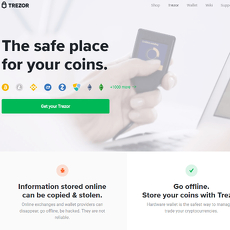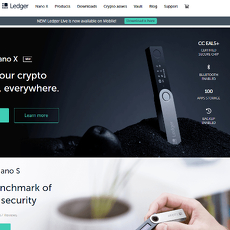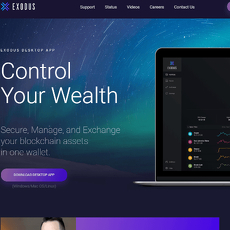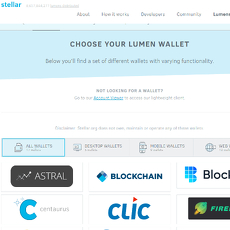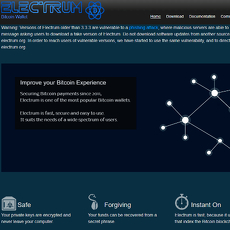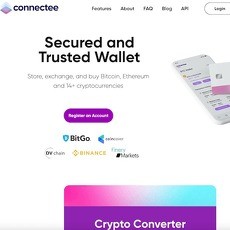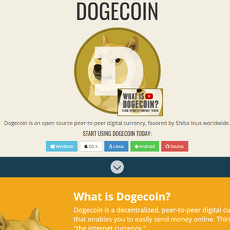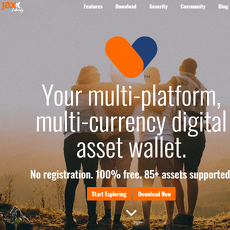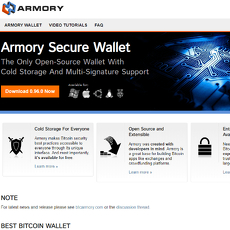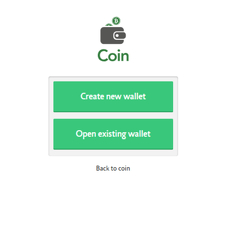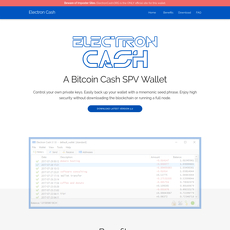Best Crypto Desktop Wallets (2026) – Windows, Mac & Linux
Best Cryptocurrency and Bitcoin Desktop Wallet: Everything You Need to Know About Desktop Wallets
Have you ever wondered which desktop wallet is the perfect match for your cryptocurrency? Or maybe you’ve hesitated because you’re unsure if desktop wallets are truly secure? Whether you’re brand new to crypto or already shoulder-deep in the world of Bitcoin and DeFi, picking the right wallet isn’t just important—it’s crucial. It’s your primary defense against theft, hacks, or losing access to your hard-earned coins.
If I told you there’s a way to keep your crypto safe while still being able to access it whenever you need without relying on someone else’s servers, wouldn’t you want to know more? That’s where desktop wallets step in, offering a balance of convenience and control. But let’s face it: with so many options, features, and technical jargon, it’s easy to feel overwhelmed. Don’t worry—you're not alone!
What challenges do people face when choosing a desktop wallet?
Choosing the right desktop wallet may sound simple—until you realize how many details you need to consider. Some common hurdles people face include:
- Security concerns: Are desktop wallets truly safe? What’s stopping someone from hacking my PC and stealing my funds?
- Which wallet can I trust? In an ever-evolving crypto world, reputations matter. It’s tough to know which wallets have real credibility in the crypto space.
- Compatibility with your cryptocurrencies: You might love Bitcoin, but if you’re also holding Ethereum, Polkadot, or lesser-known altcoins, not every wallet may support your assets.
These challenges can leave beginners feeling paralyzed. Instead of making quick decisions, they either stall or, worse, choose a wallet that might not protect their assets effectively. Sound familiar?
What if you’re worried about safety or user experience?
Let’s get real for a second. No one, myself included, wants to risk losing their crypto just because of a wallet that wasn’t secure enough or was confusing to use. Here’s where things get tricky: some wallets boast loads of features, but their interfaces can feel like they require a PhD to navigate. Others prioritize ease-of-use but may sacrifice advanced security tools that seasoned investors rely on.
So, how do you narrow it down to wallets that are both secure and user-friendly? The answer lies in knowing what to look out for before you download anything and understanding what really matters: features that fit you and your needs.
A promise to make things simple
Here’s the thing: not all desktop wallets are created equal, but you don’t need to become a tech expert to make an informed decision. By the time you’re done reading, you’ll have a crystal-clear idea of what makes a wallet truly worthwhile.
What’s better is that there’s something for everyone—whether you’re looking to store multiple coins, prioritize privacy, or just want a wallet that works without making you feel like it’s a chore. Stick with me, and I’ll break it all down step by step.
Still unsure? What if I told you that desktop wallets can be more secure than mobile alternatives—but only if you use them the right way? Wondering how they stack up against other wallet types or why so many experienced crypto enthusiasts swear by them? Let’s dive deeper and answer all your burning questions about what a desktop wallet really is and why it might just be your best crypto tool.
What is a cryptocurrency desktop wallet?
If you’re wondering how to keep your cryptocurrency safe and accessible, desktop wallets are a great solution worth exploring. Over the years, they’ve become a go-to choice for many crypto users, offering the right mix of security, functionality, and convenience. But what exactly are they, and why should you consider using one?
Definition and how they work
A cryptocurrency desktop wallet is simply software you download and install on your computer to help you store, send, and receive cryptocurrencies. Think of it as your personal digital bank vault, sitting securely on your computer instead of relying on some third-party provider. The best part? You have full control over your private keys—those all-important codes that authorize transactions and give you access to your funds.
Here’s how it works:
- You download a desktop wallet (for example, wallets like Electrum or Exodus are popular choices).
- During setup, the wallet generates a seed phrase—a set of words unique to you. This phrase acts as a backup key to recover your funds if anything happens to your computer.
- Once installed, you can store cryptocurrencies, send payments, or even manage multiple coins from one sleek interface.
It’s simple technology, but it puts the power in your hands. You'll no longer have to rely on external services to safeguard your funds.
Why choose desktop over other types?
Let’s face it, with so many wallet types out there—web wallets, mobile apps, hardware wallets—choosing the right one can be overwhelming. Still, desktop wallets stand out for a few good reasons:
- Enhanced security: Since desktop wallets operate offline (unless you're actively making a transaction), they are less vulnerable to online hacks compared to web wallets.
- Access anytime: The wallet and your funds are always accessible as long as you have your computer with you. No need to log in or deal with website outages.
- Full control: You own your private keys, which means no third party can interfere with your funds. This is critical in the world of crypto, where control is king.
- Extra features: Many desktop wallets come packed with advanced tools like portfolio tracking, staking, node connectivity, and even exchange integrations.
To put it into perspective, a desktop wallet is like having a strongbox under your control versus trusting someone else to hold onto your valuables in their “safe.” The latter can work well, but you're ultimately giving up control.
"In crypto, security equals freedom. Choose a wallet that protects not just your funds, but your peace of mind."
Who should use them?
If you're a regular crypto user who handles cryptocurrency often, then a desktop wallet might just be perfect for you. Here’s why:
- Security-conscious users: You probably don’t trust leaving your hard-earned crypto in online wallets for long-term storage. Desktop wallets give you more control, reducing exposure to risks.
- Multi-tasking investors: Imagine having the ability to manage multiple cryptocurrencies from one app. Whether it’s checking your balances, organizing your tokens, or even staking coins, desktop wallets are built to cater to active users.
- Intermediate crypto enthusiasts: For those who find mobile wallets too basic yet aren’t ready to invest in a hardware wallet, desktop wallets offer an ideal middle ground.
It’s worth keeping in mind, though, that desktop wallets work best if you’re using a personal computer with strong security measures in place—things like antivirus software, updated operating systems, and avoiding sketchy downloads. If you're managing large sums, pairing it with hardware wallets for cold storage might also be something to consider.
Still unsure if desktop wallets are the right pick? Wondering what extra value they can bring to your crypto routine? Don’t worry, we’re just getting started. The next part is all about the benefits these wallets offer. Ready to unlock the secrets behind their popularity? Let’s find out why so many people are switching to desktop wallets and loving them!
What are the benefits of using a desktop wallet?
When it comes to managing cryptocurrency, the right tools make all the difference. Desktop wallets are one of the top picks for crypto enthusiasts, and it’s no mystery why. Packed with utility and security features, they strike the perfect balance between safety and ease of use. Let’s check out why so many people swear by them and why they might just be the game-changer you’re looking for.
A balance of convenience and security
There's a common saying in the crypto space: "Not your keys, not your crypto." And that’s where desktop wallets shine. Unlike web wallets or exchanges that rely on third parties, desktop wallets give you full control of your private keys—right there on your computer.
- Offline storage: Many desktop wallets operate offline, significantly reducing hacking risks compared to web wallets that are constantly online.
- Password protection: Your wallet is shielded with vault-like security measures like strong passwords, encryption, and in some cases, two-factor authentication.
- Peace of mind: Knowing your funds are stored locally on your PC (and not floating on some exchange’s server) adds an extra layer of reassurance.
And while hardware wallets are considered the gold standard in security, desktop wallets bring a much-needed mix of accessibility without sacrificing too much on safety. It’s like having the best of both worlds.
Support for multiple cryptocurrencies
Wouldn’t it be annoying to jump between different wallets for your Bitcoin, Ethereum, and altcoins? Desktop wallets solve that headache by offering support for a wide range of cryptocurrencies, making them an ideal choice for traders and long-term holders.
For example, wallets like Exodus can handle dozens of coins and tokens in a single sleek interface. Whether you're holding Bitcoin, Ethereum, Cardano, or even lesser-known coins like Elrond or Dogecoin, there’s a good chance your desktop wallet has your back. It’s like carrying an entire crypto portfolio in your pocket (well, on your PC, but you get the point).
Plus, checking balances, managing tokens, or swapping currencies with built-in exchange functions? It’s super convenient.
Customization and advanced features
Ever wanted more than just a simple wallet for holding funds? Desktop wallets often come loaded with advanced features that put you in the driver’s seat of your crypto journey.
- Staking: Some desktop wallets let you stake crypto directly from the app, allowing you to earn passive income while your assets stay safe.
- Node connectivity: For the tech-savvy, some wallets allow direct connection to blockchain nodes for maximum transparency and control.
- Portfolio tracking: Managing scattered assets can feel chaotic. With desktop wallets, you can keep track of your portfolio's performance all in one place.
Take Coinomi, for instance. It’s a versatile desktop wallet that combines multi-coin support with the ability to stake assets and customize your interface preferences. These extra features don’t just make managing crypto a breeze—they elevate the entire experience.
And here’s the kicker: Most of these wallets are free. That’s right. Free. You don’t need to shell out hundreds of dollars for some high-end gadget or subscription service. It’s proof that top-quality tools don’t always come with a hefty price tag.
“Great tools not only save time but help you move smarter.”
Now you’re probably wondering: If desktop wallets sound this good, why isn’t everyone using them? Well, not all wallets are built the same. So how do you pick the one that checks all the boxes for security, compatibility, and ease of use? That’s exactly what we’re going to explore next.
What features should you look for in a desktop wallet?
Choosing the ideal desktop wallet can feel like a minefield, especially when every platform claims to be the "safest" or "most user-friendly." But here's the truth: not all wallets are created equal. Some miss critical security layers, while others make a simple process unnecessarily complex. To make the best choice, you need to focus on key features that guarantee both safety and practicality. Let’s dig into the most important ones.
Security features
Your wallet is your fortress, and security should always be your top priority. The last thing anyone wants is to lose their assets because of poor safeguards. When you’re evaluating a wallet, make sure it includes:
- Encryption: Your data should be protected with reliable encryption protocols to prevent hacking attempts.
- Backup options: A wallet that lets you easily back up your data makes it easier to recover your funds in case of a system crash or unexpected event.
- Private key control: Always, and I mean always, choose a wallet that gives you full access to your private keys. "Not your keys, not your coins" isn’t just a phrase—it’s the truth.
Studies show that wallets with robust encryption and backup tools drastically minimize the chance of loss. For example, wallets like Electrum feature password-protected backups, ensuring you’re covered no matter what.
Compatibility with crypto coins
Let’s be honest—your wallet is only as good as the coins it can handle. Imagine downloading a wallet, transferring funds, and then realizing it doesn’t support the token you just bought. Painful, isn’t it?
Here’s the golden rule: check compatibility before committing. Many wallets are designed around popular coins like Bitcoin, Ethereum, and Litecoin. But if you’re into niche or emerging cryptocurrencies, you’ll need to dig a bit deeper. Wallets like Coinomi are known for supporting hundreds of coins, making them a favorite for multitasking crypto enthusiasts.
Keep in mind, some wallets regularly add support for new tokens. Always choose platforms that stay updated with the evolving crypto space.
User-friendly interface and additional features
Ever opened an app and instantly felt overwhelmed? That’s not what you want with your crypto wallet. A good desktop wallet should create a seamless and frustration-free user experience—something both beginners and seasoned users can appreciate.
Here’s what to look for:
- Simple setup: If you’re new, interfaces like those in wallets like Exodus can walk you through setting up, transferring, and even storing your coins with zero headaches.
- Essential tools: Features like seed phrase generation (the key to recovering your wallet) and multisig (multiple signatures required for transactions) add valuable layers of security.
- Advanced options: For the more experienced, staking options or integration with hardware wallets, like Ledger, can enhance usability. These features give you the best of both worlds: simplicity when you want it, and control when you need it.
Let’s not forget, wallets like Guarda even let you stake coins directly from your desktop, which turns your wallet into an income generator rather than just a storage space. How cool is that?
"Good tools make complex tasks easier; great ones make them invisible." — Chris Sacca
A desktop wallet should be that great tool for you. Easy to use, yet powerful enough to grow with your skills in crypto.
So, you now know what to look for when deciding on a desktop wallet—security, compatibility, and usability. But which wallet checks all these boxes? Which one combines these features in a balanced way? Or better yet, is there a perfect wallet? Let’s find out next!
The Best Bitcoin and Cryptocurrency Desktop Wallets to Consider
When it comes to safeguarding your crypto, choosing the right desktop wallet isn’t just about picking what’s popular—it’s about finding the one that fits you. Every wallet brings something unique to the table, whether it’s security, usability, or support for multiple coins. Let’s take a look at some of the top-performing wallets in the market and why they’re worth your attention.
Wallet Recommendations and Highlights
- Electrum: This lightweight wallet is a no-frills solution trusted by Bitcoin holders since 2011. It’s fast, doesn’t require downloading the entire blockchain, and lets you set custom fees. Advanced users will appreciate Electrum’s cold storage and multisig functionality. But keep in mind—it supports Bitcoin only, so this one’s perfect if BTC is your focus.
- Exodus: If you’re new to the crypto space and value design as much as functionality, Exodus is your go-to. With its beginner-friendly interface and stunning graphics, managing over 260 coins and tokens has never been easier. It even has an integrated exchange so you can trade within the wallet. However, be cautious—this wallet is closed-source, meaning some users may prefer alternatives for complete transparency.
- Coinomi: Need to manage a variety of coins? Coinomi has got you covered. Supporting over 1,700 cryptocurrencies, this wallet is perfect for those with a diverse portfolio. It’s also multilingual, making it accessible worldwide. The best part? It’s free to use and keeps your private keys stored locally on your device for added security.
- Guarda: Think of Guarda as your all-in-one solution. Not only does it support multiple coins across different platforms (desktop, web, and mobile), but it also offers staking features for earning passive income. It’s simple to use, but don’t let that fool you—it packs a punch with encrypted backups and full control over your private keys.
- Ledger Live (paired with Ledger hardware wallets): If you're all about security but still crave the convenience of desktop software, Ledger Live bridges the gap. While it works best paired with a Ledger hardware wallet, its desktop app makes managing your crypto feel both secure and seamless. This setup is ideal for those who take security seriously but don’t want to sacrifice usability.
Which One Is Perfect for You?
So, how do you choose? It all comes down to what matters most to you:
- Focus on top-notch security? Electrum or Ledger Live paired with a hardware wallet will be your best bet.
- Want simplicity and an interface that’s easy on the eyes? Exodus is like the Apple of wallets—it just works.
- Diversifying your portfolio across multiple coins? Coinomi and Guarda shine for multi-asset management.
- Looking to earn rewards while holding your crypto? Check out Guarda for its staking options.
Still unsure? Here’s a quote that might resonate:
“Your wallet choice speaks volumes about how seriously you take your crypto investments.”
Whether you're safeguarding thousands or experimenting with your first $50, the right wallet can be a game-changer.
Now, what about safety? Are desktop wallets truly secure, or do they leave you exposed to risks? Let’s uncover the truth about their security features next.
How Secure Are Desktop Wallets?
Security is one of the biggest concerns for anyone storing cryptocurrency. Let’s face it—losing access to your wallet or falling victim to a hack is a nightmare scenario. Thankfully, desktop wallets offer layers of protection that will make you sleep a little easier, but how safe are they really? Let me break it all down for you.
Offline Protection Reduces Risk
Did you know that your private keys (the keys to your crypto kingdom) never leave your computer when you’re using a desktop wallet? Unlike online wallets or exchanges that keep your keys on remote servers, desktop wallets store these keys directly on your device. This offline storage, often referred to as “cold storage,” significantly reduces the risk of hackers gaining access to your funds.
As long as your computer stays secure and uncompromised, you’ve got a solid barrier protecting your crypto. For example, wallets like Electrum are widely used because they ensure private keys remain on your local machine, meaning there’s no third-party server to worry about. It’s all about keeping control in your hands.
Regular Updates and Vulnerability Fixes
Here’s something many people overlook—choosing a wallet that’s actively maintained by its developers is a non-negotiable. Why? Because the crypto world moves fast, and new vulnerabilities can pop up at any time. A wallet with regular updates ensures these weaknesses are identified and patched quickly, protecting your assets from potential exploits.
For instance, the Exodus wallet is known for its frequent updates, which not only introduce new features but also tackle any security concerns. You don’t want to rely on a wallet that hasn’t been updated in years—that’s like living in a house with broken locks. Look for wallets with an active GitHub repository or community presence to stay safer.
Tips to Stay Secure
Even the most secure wallet needs your help to stay safe. Here are some practical tips that can go a long way in protecting your crypto:
- Watch where you download: Only download wallets from their official websites. Scammers are experts at mimicking legitimate platforms with fake versions designed to steal your keys.
- Use antivirus software: Keep your device protected from malware or keyloggers that could target your wallet files.
- Back up your seed phrase: Your seed phrase is your wallet's safety net. Write it down and store it somewhere only you can access—preferably offline, like in a fireproof safe. Never save it digitally.
- Enable two-factor authentication (2FA): If your wallet supports it, always have an extra layer of security through 2FA.
- Stay updated: Regularly check for those wallet updates we talked about earlier and install them immediately.
A great quote sums up this part:
“The only truly secure system is one that’s powered off, cast in a block of concrete, and sealed in a lead-lined room with armed guards.” – Gene Spafford.
While we can’t quite go this far with a desktop wallet, adopting strong habits can make your wallet as close to impenetrable as possible!
Now you might be wondering, are desktop wallets too complicated for beginners, or is this level of security suitable even for someone just starting out? Don’t worry—next, we’ll explore whether desktop wallets can match the simplicity some users need and how to avoid early mistakes. Ready to learn more?
Are Desktop Wallets Good for Beginners?
Starting anything new can feel overwhelming, and cryptocurrency is no different—it’s like stepping into a whole new world. When it comes to desktop wallets, beginners often wonder if they’re too complicated or risky. The good news is that many desktop wallets are actually designed with beginners in mind! Let me show you why desktop wallets can be a fantastic starting point and how to avoid some common missteps along the way.
Why Some Are Easy to Start With
Not all desktop wallets require you to be a tech genius! Thanks to developers understanding user needs, wallets like Exodus and Coinomi come packed with an intuitive design that feels less like coding software and more like a simple app you’d use every day. Here’s what makes them beginner-friendly:
- Clean Interfaces: Everything is laid out clearly, so you won’t get lost searching for basic tools like "Send," "Receive," or portfolio tracking.
- Easy Setup: Many wallets guide you step-by-step to create your first crypto account, making the process stress-free.
- No Learning Curve: You don’t need to watch hours of tutorials; these wallets make crypto feel less intimidating.
If you’ve ever been nervous about trying something new, remember this quote from Richard Branson: “If somebody offers you an amazing opportunity but you are not sure you can do it, say yes—then learn how to do it later!” Desktop wallets can be your gateway to crypto, and you’ll pick up the details as you go.
Common Beginner Mistakes to Avoid
No one wants to mess up their first crypto experience, especially when there’s money involved. But don’t worry—it’s easier to avoid mistakes when you know what they are upfront. Here are the top pitfalls beginners sometimes fall into and how to steer clear of them:
- Sending Funds Without Testing First: Always send a small amount for your first transaction to make sure everything works as expected. Mistakes happen, but this tip ensures they don’t cost you much.
- Losing Your Seed Phrase: Your wallet’s seed phrase is your ultimate backup. Write it down, store it securely (preferably offline), and NEVER share it with anyone. Think of it as the password to your crypto life—it’s that crucial.
- Downloading Fake Wallets: Always download wallets from their official website or trusted platforms. Scammers are out there trying to prey on beginners, so double-check before you install.
By avoiding these beginner traps, you’re already way ahead of the game! Every crypto enthusiast started right where you are now, and trust me—mistakes don’t define you, but learning from them does.
How to Build Confidence with Desktop Wallets
Getting comfortable with desktop wallets doesn’t happen overnight, but there are ways to ease into it without feeling overwhelmed. Here are some tips to help you build that confidence:
- Start Small: Don’t transfer all your funds into a wallet right away. Start with an amount you feel okay experimenting with, and work your way up as you gain trust in the wallet.
- Test the Features: Familiarize yourself with the wallet by checking out its features, like viewing your portfolio or practicing a small transaction. The more you explore, the more at ease you’ll feel.
- Ask the Community: Most wallets have dedicated user communities or forums where you can ask questions and get real-world advice from more experienced users.
Remember: It’s perfectly normal to feel nervous at the start. With a bit of practice and patience, you’ll soon feel like a pro managing your crypto from your desktop. Every step builds confidence, and every win—big or small—gets you closer to mastering digital assets.
Here’s a thought: If desktop wallets are such a solid option for beginners, how do they stack up against mobile, hardware, and web wallets in terms of flexibility and security? We’ll tackle that next, so stay tuned!
Comparing Desktop Wallets to Other Types
When it comes to managing your cryptocurrency, one size definitely doesn’t fit all. There are multiple types of wallets to choose from, and desktop wallets are just one option. But how do they compare to mobile, hardware, and web wallets? Let’s break it down to see where desktop wallets shine and where they might fall short.
Desktop vs. Mobile Wallets
Here’s the thing: mobile wallets are all about portability. They’re convenient for people who need quick access to their crypto while on the go. Want to pay for a coffee in Bitcoin or scan a QR code for instant transfers? A mobile wallet is your best friend.
But here’s the catch – mobile wallets put you at greater risk of hacking, especially if your smartphone gets infected with malware. Compared to desktop wallets, they can feel a little more “exposed.” Desktop wallets, on the other hand, tend to have stronger encryption and lock your private keys safely offline (as long as you’re not connected to the internet).
Sure, you can’t pop a desktop wallet into your pocket, but for a lot of users, the better security makes the trade-off worth it. If you care more about locking your assets safely at home versus portability, the desktop option wins this battle.
Desktop vs. Hardware Wallets
Now here’s where it gets interesting – hardware wallets are often seen as the “Fort Knox” of crypto storage. They keep your private keys completely offline and out of reach from online threats. If you’re holding a large amount of cryptocurrency and sweating over security, a hardware wallet like Ledger or Trezor might feel like a no-brainer.
But let’s be real for a second: hardware wallets are not the most convenient. You have to carry around a physical device, plug it in, and follow an extra set of steps for every transaction. For anyone actively managing their crypto, like trading or staking, this can feel like overkill. That’s where desktop wallets come into play. They balance usability with solid security, making them perfect for people who need frequent access but don’t want to sacrifice too much on safety.
So, if you want the absolute maximum protection, hardware wins. But for most practical day-to-day crypto activity? Desktop wallets offer a sweet spot between convenience and security.
Desktop vs. Web Wallets
Web wallets are easily the most accessible option out there. They run directly in your browser, which means you can log in from anywhere, anytime. This makes them a popular choice for beginners or users who prioritize convenience above everything else.
But here’s the harsh reality: web wallets put you into a high-risk category. When your private keys are managed online, you’re relying on someone else to secure your funds. Add the constant threats of phishing, scams, and data breaches, and suddenly the convenience doesn’t sound as appealing.
Desktop wallets, on the other hand, give you full control. The private keys are stored locally on your computer, meaning you’re not dependent on third-party servers. Yes, they’re less convenient if you need to access your crypto while traveling, but for anyone serious about keeping their assets safe, this trade is easily justified.
Which One Is Best for You?
So, now you know the difference. Desktop wallets sit comfortably in the middle: not as portable as mobile wallets, not as bulletproof as hardware wallets, but safer and more versatile than web wallets. It’s all about finding what fits your lifestyle and security needs. But here’s something to think about: Are you willing to sacrifice a little convenience for more peace of mind? Or maybe you’re ready to combine strategies and use multiple wallet types together?
Either way, there’s one thing that’s crystal clear – finding the right wallet is one of the most important choices you’ll make in your crypto journey. What’s next? Stick around, because in the next part, I’ll help you wrap it all up and guide you toward making that perfect choice.
Final Thoughts: Choosing the Best Desktop Wallet for You
By now, you've likely got a clear picture of what makes a great desktop wallet. But before you click that "download" button, let’s put everything into perspective and make sure you’re truly confident in your choice. Picking the right wallet isn’t just about features—it’s about finding the one that matches your needs and keeps your crypto safe.
What’s your need: Security, simplicity, or extra features?
Here’s the thing: not all wallets are created equal. Some people prioritize absolute security above all else, while others crave simplicity or advanced tools. Start by considering your personal priorities.
- If security is king: Look for a wallet that offers features like offline access, strong encryption, and control over your private keys. Options like Electrum or using Ledger Live paired with hardware wallets might be your best bet.
- If simplicity is your top priority: A wallet like Exodus is perfect. It’s beginner-friendly, visually appealing, and still checks the security box without feeling overwhelming.
- If you want extra bells and whistles: Go for wallets that support advanced tools like staking, portfolio tracking, or multi-asset management. Guarda and Coinomi are solid picks here.
Think about this: there's no "perfect" wallet that works for everyone. But there is a wallet that’s just right for you. Whether you’re hodling for the long term, staking for passive profits, or trading the latest altcoins, take the time to align your wallet with your lifestyle.
Take action today
This is important. Too many folks keep putting off setting up a proper wallet, and then—boom—a phishing scam or exchange hack wipes out their funds. Don’t wait until it’s too late to take control of your crypto.
Setting up a desktop wallet doesn’t have to be complicated. Most of the recommended ones can run on any basic computer and take just a few minutes to configure. Once it's up and running, your peace of mind will be worth it. Start small if you’re hesitant—store just a portion of your assets and test sending or receiving tiny amounts. With this simple practice, you’ll gain confidence and make sure everything works like a charm.
Your crypto journey is just beginning
Whether you’re new to cryptocurrencies or an experienced trader, managing your digital assets shouldn’t feel overwhelming. Choosing a desktop wallet is just one step in creating a solid foundation for your crypto journey. And let’s be honest—a well-chosen wallet isn’t just a tool, it’s your safeguard and your gateway to financial independence.
So go ahead, download your wallet of choice, double-check your security settings, and maybe jot down your seed phrase in two different, safe locations (yes, it’s that important). Once you’ve taken these steps, you’ll be in full control of your funds—and there’s no better feeling than that.
Remember, the world of crypto is always evolving, and you’ve just started taking charge of your financial future. Keep learning, stay safe, and enjoy the ride. Your journey has only just begun.

